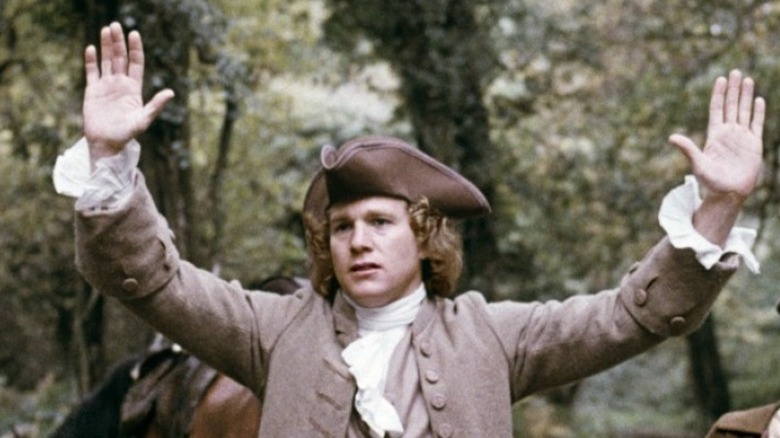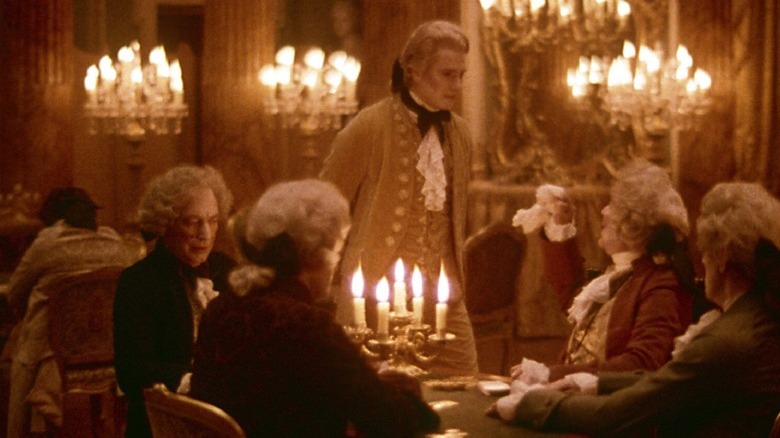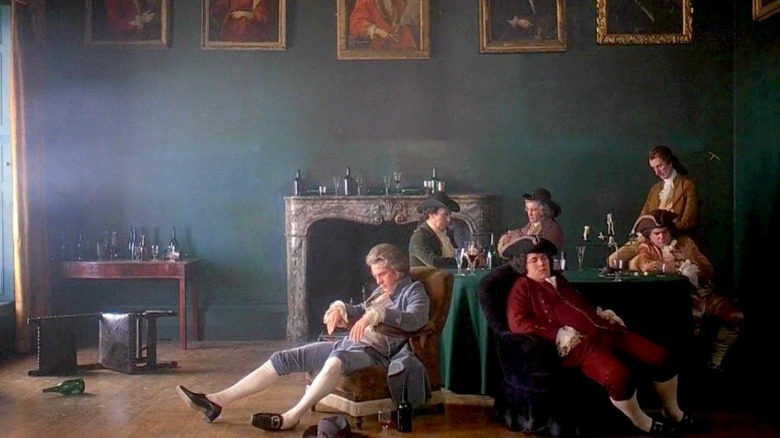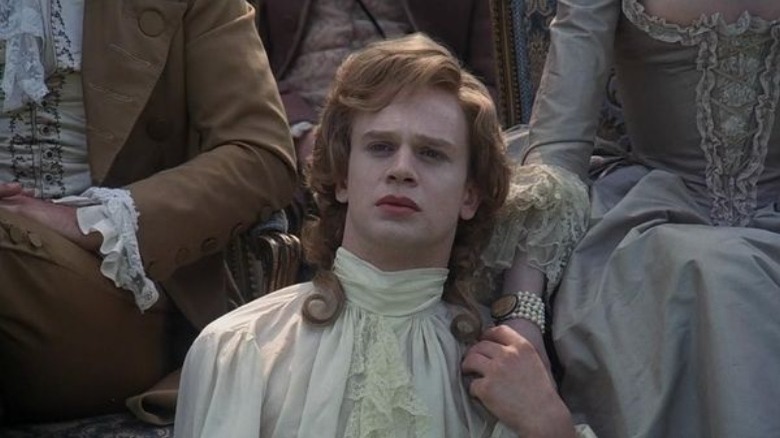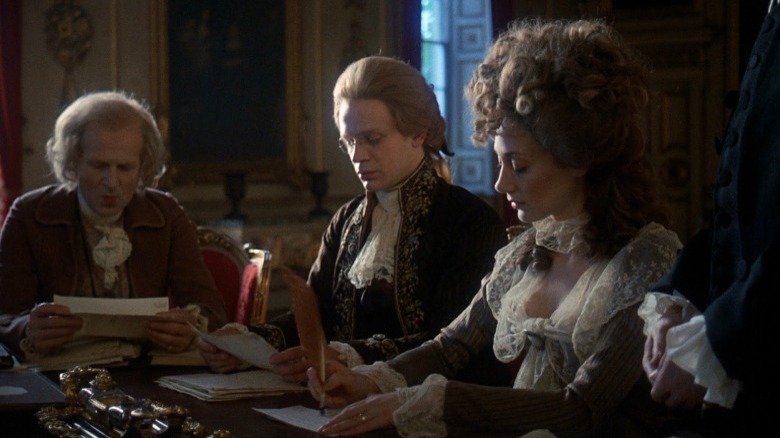Barry Lyndon Ending Explained: They Are All Equal Now
With 1975's "Barry Lyndon," Stanley Kubrick took the constraints of the novelistic period piece and tore them apart. This adaptation of William Makepace Thackeray's novel "The Luck of Barry Lyndon" follows the rules of the so-called costume drama, the repression and restrained manners, and turns them into something else. The movie is chaotic and bitterly ironic, establishing and exploring two of Kubrick's most compelling characters over the course of its three hours.
Just before its making, Kubrick had previously explored the far reaches of space with "2001: A Space Odyssey" and the chilling causes and effects of violence with "A Clockwork Orange." Watching his movies gives the impression of a vast openness, not just in the compositions but in the staging of the characters and the viewer's flexibility of interpretation. His movies were massive and unpredictable simultaneously, inventing whole new worlds and visual languages out of nowhere. In search of something new, he had a tendency to challenge even actors like Jack Nicholson with 1980's "The Shining."
"Barry Lyndon" does all of that while telling its fatalistic story from a disinterested third-person point-of-view, one that skips over major passages of its characters' lives and leaves the viewer to make sense of it all.
Redmond Barry (Ryan O'Neal) is something of a grifter, an "Irish upstart" whose tragic history has left him on the run through 18th century Europe, a bit like a darker take on "Forrest Gump." He skips through warzones and becomes a notorious gambler. He is the kind of man who seduces a woman, the Countess of Lyndon (Marisa Berenson), and is willing to provoke her husband (Frank Middlemass) so he can marry her and take her name.
The historical perspective
But that's just part one of the "Barry Lyndon" story: "By What Means Redmond Barry Acquired the Style and Title of Barry Lyndon." Part two will necessarily be the character's fall, the "Misfortunes and Disasters" that befall him.
The regal, dignified tone of the text characterizes the voice-over in the film, the proper English of Narrator Michael Hordern. The movie has such a dryly historical tone that the voiceover becomes another kind of joke, an ironic counterpoint to its hero's striving and recklessness. Unlike the electric, friendly narration of Ray Liotta in "Goodfellas," Hordern's work is cold and dispassionate. It solved a "cumbersome" problem for Kubrick.
Where Thackeray's novel was told from Barry's perspective and found humor in all of his unreliability, the movie incorporates a third-person POV that, on the surface, reiterates what we see. But digging in reveals the lies in which Barry surrounds himself.
When the camera first lays eyes on Lady Lyndon, for instance, the Narrator gives a brief description of her, her husband, and her son Lord Bullingdon (Dominic Savage as a child, Leon Vitali as an adult) that mentions their closeness, something we soon see to be a major understatement.
After Barry's seduction of Lady Lyndon, the Narrator says simply, "To make a long story short, six hours after they met, her ladyship was in love." But Lord Lyndon is more direct, accusing Barry of cuckolding him and screaming at him under powdered makeup. Barry's provocations of the old man lead to him dying. The Narrator effectively gives him an obituary, claiming that the Lord has left behind a title.
He also all but ignores the miserable mood that has overtaken Lady Lyndon and Lord Bullingdon, noting only that she was "rarely happy."
A living painting
The movie's second half largely dispenses with the adventuring by which Barry acquired his style and title. Instead, it languishes in slow misery as the newly minted Lord Barry enjoys the life his striving has granted him. In Stanley Kubrick's meticulous vision, the Castle Lyndon becomes a palace like the Overlook Hotel of "The Shining," grand and claustrophobic with its disorienting hedge mazes.
According to Tim Robey's article on the movie's photography, these stuffy interiors were designed to mimic 18th century paintings, particularly those of William Hogarth. Kubrick's compositions and long zoom-outs, shot by John Alcott, call attention to the tight constraints of these characters' world.
It's in this world that Lord Bullingdon, tasked with calling his mother's husband Barry his "father," grows up to become a resentful young man. He obsesses over his stepfather's infidelity and reckless spending of money. He tearfully strokes his mother's hand while watching his young half-brother Bryan (David Morley) enjoy getting pampered.
Bullingdon and Barry become natural enemies as the latter seeks control of the estate, and their battle is hilarious, compelling, and psychologically rich. Now an adult, Bullingdon loathes the man his mother married, as well as the child she had with him. When Barry catches Bullingdon beating his younger brother over a pencil, he gets genuinely angry, humiliating Bullingdon by beating him as well. But Bullingdon warns him he will take "no further chastisement," and he means it.
The two sons
What makes Lord Bullingdon so compelling and so funny is his ability to break through the movie's trappings. There's never a sense that he's playing the 18th century period rule book, never a sense he's following the decorum of the time. He is a pathetic, hateful man relishing in his contempt for Barry. Where other characters will look like William Hogarth paintings, Bullingdon's expressiveness breaks through the powdered makeup and collapses the flimsy norms of the world.
He crashes the party Barry has thrown for Lady Lyndon, exclaiming that he will leave the castle for as long as Barry is there. In front of this crowd, a number of powerful individuals whom Barry hopes to impress, he calls the man out for his behavior and his weak character. And Barry attacks him.
Here, the camera, so still throughout so much of the movie, goes handheld, an inspired move that demonstrates to the viewer how destructive Barry's actions are. Not only does it destroy his relationship with the Lady, he has also lost the friendly eye of high society. As the Narrator says, "His friends fell away from him."
It's through this psychological richness and visual inventiveness that the movie came to be seen as one of the best historical epics ever made. The formerly full halls give way to emptiness, as in the massive wide shot of Barry reading to Bryan. As a replacement for his highly conditional friendships, he spoils his boy. And the bills begin to pile up as the chickens come home to roost after Barry's reckless spending. But he can't help himself, and he buys Bryan a horse, who eventually throws the boy to the ground in a move that will eventually kill him.
The high tide of fortune
With their son dead, both Barry and Lady Lyndon fall into a depression, one accentuated by the tremendous debt Barry has accumulated. As their former employees seek Bullingdon to put things right, Lady Lyndon attempts to kill herself. Bullingdon challenges Barry to a duel, and shoots his stepfather in the leg, causing an injury in need of amputation.
Having lost his son, Barry then loses everything else: his leg, his castle, his marriage. Bullingdon strikes a deal whereby Barry receives an annual cheque of 500 guineas, just so long as he never returns to England. And he leaves, with the Narrator informing us that he returned first to Ireland and then to Europe, where he resumed his old career as a gambler, "without his former success."
Finally, we return to Castle Lyndon, with Bullingdon back by his mother's side, helping to clear her finances. Her feelings, as always, remain ignored, and Stanley Kubrick cuts directly from her face to her cheque for Barry. Bullingdon looks to her. They return to their accounts, and a text epilogue informs us that "Good or bad, handsome or ugly, rich or poor — they are all equal now."
Making "Barry Lyndon" took a huge toll on the film's cast and crew, and the epic that resulted still feels ahead of its time. The rich psychology of its two main characters and their bizarre clash of egos makes for an incredible drama. But the key thing to keep in mind is that no matter their striving, their personal failings, and their shameful mistakes, time has left them behind, which is why the Narrator has spoken of everybody with the same stately distance.
